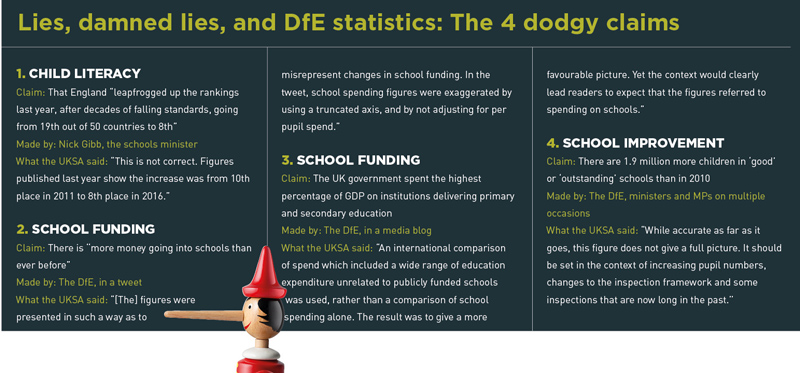The Department for Education has been told to publish a “comprehensive set” of official figures on school funding after another slap down by the stats watchdog.
The call came in two new letters sent from Ed Humpherson, director general for regulation at the UK Statistics Watchdog (UKSA), today warning the department again over its use of statistics.
The letter urged the department to focus on “not just whether the statements correctly quote the statistics, but also whether, in the context, the use being made of them is liable to mislead”.
It is the fifth time in the past 18 months that the DfE has been reprimanded by the statistics watchdog for its use of figures.
The UKSA has now formally recommended the DfE regularly publish official figures laying out school funding, something the department is said to be “considering”.
In a letter sent today to Neil McIvor, chief data officer and chief statistician at the DfE, Humpherson said there had been improvements “made to enhance the quality and trustworthiness of statements released”, but there are still “concerns”.
For a meaningful debate about public spending, it is necessary to have a trustworthy data source
“Your department has strived to improve the technical accuracy of statements made on school funding. However, we have concerns with the presentation of school funding figures,” the letter read.
Examples of complaints received included over schools minister Nick Gibb’s use of school spending figures on Channel 4, where it “was not clear from the minister’s statements that he was referring to schools’ budget for 5 to 16 years olds only”.
Concerns were also raised about other statistics used by the department’s ministers, such as the replicability of music GCSE figures used by Gibb in an oral evidence session in the House of Commons, and another from education secretary Damian Hinds over claims regarding improved outcomes for sponsored academies since 2010.
The letter continued: “In light of these issues, we have discussed the importance of ensuring that statements are based on accurate, up to date analysis, which can be verified through publicly available data and analysis.
“I welcome your team’s on-going work to improve transparency of statements in an efficient way. In addition, I would encourage you to focus on not just whether the statements correctly quote the statistics, but also whether, in the context, the use being made of them is liable to mislead.”

In a separate letter to permanent secretary Jonathan Slater, Humpherson said: “For a meaningful debate about public spending in any area, it is necessary to have a trustworthy data source.”
He said the lack of a “comprehensive set of official statistics on the funding of schools” means other sources are used to inform the debate.
“This in turn can mean that statements using data are hard to verify and replicate, and this creates a risk of undermining the perceived trustworthiness of those making the statements,” Humpherson added.
The UKSA said there is no official funding statistics that cover:
– National, local authority and school-level funding, both at total and per-pupil level, in cash terms, and adjusted for inflation
– Historic and present funding for schools
– Data limitations and policy changes which should be considered in the analysis of school funding figures
But the UKSA letters show the department is “considering the potential for publishing regular official statistics on school funding”.
The department was warned over its repeated misuse of data back in October, with the watchdog highlighting “potentially misleading” claims on schools funding.
One statistics expert stated the flurry of letters amounted to a “blistering” attack from the watchdog, including a decision that the DfE’s use of the controversial OECD funding statistic “was presented in such a way as to misrepresent changes in school funding”.
A DfE spokesperson said: “We always strive to make data as clear and accessible as possible. We continue to work closely with the UKSA to identify further improvements.”







Your thoughts